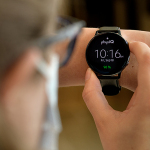PhysIQ and Purdue University launch study to develop algorithms for detecting earliest signs of COVID-19 from biometric smartwatch data

WEST LAFAYETTE, Ind.–(BUSINESS WIRE)–#COVID19–Certain changes in a person’s heart and breathing rates could precede symptoms of COVID-19, an increasing number of studies suggests.
Purdue University researchers have begun a study that would help determine if continuously collected biometric smartwatch data could be used to reliably and accurately detect these signs early, which could indicate that a potentially asymptomatic user should get tested for COVID-19.
Data from the study will inform new algorithms to be developed by physIQ, a Purdue-affiliated digital health technology company based in Chicago. The company has support from the Purdue Research Foundation’s Foundry Investment Fund.
Smartwatches on the market already collect a wide range of physiologic data, but incorporating metrics such as heart rate, heart rate variability and respiration rate that may help detect COVID-19 at the earliest stages will take more research, studies by companies such as Fitbit have stated.
Although smartwatch-like devices are not currently substitutes for gold-standard diagnostic tests used in clinics and hospitals, some wearable devices are starting to serve as tools for helping a clinician make a diagnosis.
“There won’t be a point where a smartwatch can tell you that you’re COVID-19 positive, but it could potentially say, ‘Within the next couple of days, you might be getting sick and should go get tested,’” said Craig Goergen, Purdue’s Leslie A. Geddes Associate Professor of Biomedical Engineering.
Previous studies have shown that viral infections increase resting heart and respiration rates and decrease heart rate variability before a patient develops a fever, Goergen said. It’s not yet known if these indicators, particularly respiration rate, can be measured reliably enough at the wrist to imply infection.
“An increased heart rate or respiration rate means something different if it increased while you were resting as opposed to running, but most smartwatches have difficulty distinguishing that. So it is really recovery and resting periods that we are focused on with this approach,” Goergen said.
In a study of up to 100 participants, Goergen’s team will first determine whether wearing a smartwatch to collect these indicators is practical, unobtrusive and user-friendly. The researchers are recruiting Purdue students, staff and faculty as study participants.
Each participant will be mailed a Samsung Galaxy smartwatch with a physIQ app loaded to collect data, FDA-cleared adhesive chest-based biosensors that collect a single-lead electrocardiogram signal, and a Samsung Galaxy smartphone to use for five days of continuous monitoring while Goergen’s lab analyzes data from the app remotely using physIQ’s cloud-based accelerateIQ platform.
Data from the chest patches will be processed by physIQ’s FDA-cleared artificial intelligence-based algorithms for deriving heart rate, respiration rate and heart rate variability. These data will serve as “gold standard” references to compare with data from the smartwatches.
Researchers led by Fengqing Maggie Zhu, a Purdue assistant professor of electrical and computer engineering, will analyze data collected by Goergen’s lab and determine how much of it could be used to train algorithms for developing smartwatch software aimed at detecting these metrics better. Watchband tightness, for example, could affect data availability and quality.
“We recognize this work as the first step in enabling advanced personalized analytics for continuous monitoring of individuals using smartwatch data,” said Stephan Wegerich, physIQ’s chief science officer. “This could lead to a solution that is applicable to many physiological monitoring applications in both clinical trial markets as well as in healthcare delivery.”
The end goal is that the software, which a smartwatch would access from a cloud-based server, would show subclinical changes in metrics unique to the individual by “learning” from large amounts of data continuously collected while wearing the watch.
The researchers plan to eventually expand the study to include individuals at high risk of contracting COVID-19.
The work is funded by a faculty innovations grant from Protect Purdue, the university’s initiative to keep the campus and surrounding community safe from COVID-19.
About physIQ
PhysIQ is a leading digital medicine company dedicated to generating unprecedented health insight using continuous wearable biosensor data and advanced analytics. Its enterprise-ready cloud platform continuously collects and processes data from any wearable biosensor using a deep portfolio of FDA-cleared analytics. The company has published one of the most rigorous clinical studies to date in digital medicine and are pioneers in developing, validating, and achieving regulatory approval of Artificial Intelligence-based analytics. With applications in both healthcare and clinical trial support, physIQ is transforming continuous physiological data into insight for health systems, payers, and pharmaceutical companies. For more information, please visit www.physIQ.com. Follow us on Twitter and LinkedIn.
About Purdue University
Purdue University is a top public research institution developing practical solutions to today’s toughest challenges. Ranked the No. 5 Most Innovative University in the United States by U.S. News & World Report, Purdue delivers world-changing research and out-of-this-world discovery. Committed to hands-on and online, real-world learning, Purdue offers a transformative education to all. Committed to affordability and accessibility, Purdue has frozen tuition and most fees at 2012-13 levels, enabling more students than ever to graduate debt-free. See how Purdue never stops in the persistent pursuit of the next giant leap at https://purdue.edu/.
Contacts
Media Contacts
Christa Carroll
Senior Vice President
Outlook Marketing Services
Ph: 630-408-9164
christa@outlookmarketingsrv.com
Writer, Media contact: Kayla Wiles, 765-494-2432, wiles5@purdue.edu
Source: Craig Goergen, cgoergen@purdue.edu


